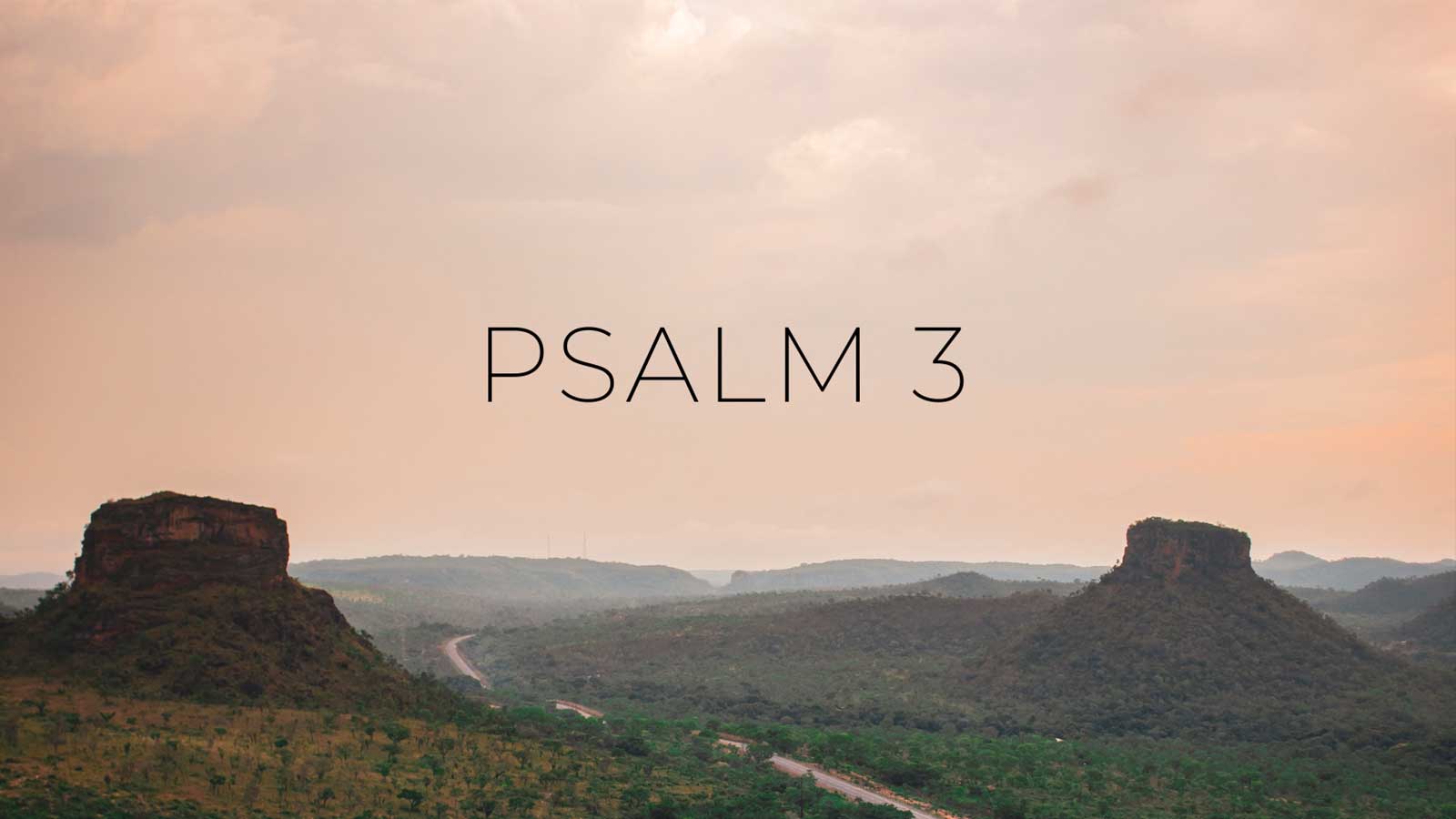Psalm 3
The Psalm 3 is a prayer born in a moment of deep sorrow, yet it carries a lesson of unwavering trust. David, when composing these words, was fleeing from his own son, Absalom, who had risen against him. Even when surrounded by enemies, the king cries out to the Lord, revealing the strength that can only come from faith.
Right in the first verses, we feel the tension and despair of one being hunted. But as we progress in the reading, the tone changes: a firm certainty emerges that God does not abandon His own. Psalm 3 is therefore both a cry out and a declaration of trust. It is the portrait of a soul choosing to rely on God, even when everything around seems to crumble.
Complete Psalm 3
1 Lord, how many are my adversaries! They are many who rise against me.
2 Many say of my soul, “There is no salvation for him in God.” (Selah.)
3 But You, O Lord, are a shield around me, my glory, and the One who lifts up my head.
4 With my voice I cried out to the Lord, and He answered me from His holy hill. (Selah.)
5 I lay down and slept; I woke again, for the Lord sustained me.
6 I will not be afraid of ten thousands of people who have set themselves against me all around.
7 Arise, O Lord; save me, my God, for You struck all my enemies on the cheek; You broke the teeth of the wicked.
8 Salvation belongs to the Lord; Your blessing be on Your people. (Selah.)

Understanding Psalm 3 Verse by Verse
Psalm 3 is a sincere expression of the soul in the face of anguish. Below, you will find a detailed explanation of each verse, revealing the spiritual richness contained in this powerful prayer.
1 – Lord, how many are my adversaries! They are many who rise against me.
In this first verse, David begins with an anguished cry. He acknowledges that he is surrounded by many enemies. The word “many” shows that the problem is neither isolated nor small. Psalm 3 starts with a feeling of suffocation in the face of ever-growing threats. Here, we see how important it is to bring our pain before God, without filters.
2 – Many say of my soul, “There is no salvation for him in God.” (Selah.)
In this portion of Psalm 3, David expresses the scorn he hears from his enemies. They not only attack him physically but also try to destroy his faith, saying that not even God will save him. The phrase “There is no salvation for him in God” is laden with mockery. “Selah” indicates a pause for reflection, as if inviting a deep contemplation of this injustice.
3 – But You, O Lord, are a shield around me, my glory, and the One who lifts up my head.
Here comes a powerful turnaround. Psalm 3 now brings the response of faith. David stops focusing on his enemies and turns to God. He declares that the Lord is his shield—a living protection standing between him and danger. Moreover, God is his glory and the One who lifts his head, meaning He restores his dignity and courage.
4 – With my voice I cried out to the Lord, and He answered me from His holy hill. (Selah.)
David testifies that God hears his prayer. Psalm 3 reinforces that physical distance (fleeing from Jerusalem, where the holy hill was) does not prevent connection with the Lord. He prays, and the Lord answers. The “Selah” here again invites us to pause and reflect on the divine faithfulness that responds to sincere pleas.
5 – I lay down and slept; I woke again, for the Lord sustained me.
This verse of Psalm 3 reveals the supernatural peace that comes from trusting in God. Even while being pursued, David is able to sleep. Moreover, he wakes because the Lord sustained him. This is one of the greatest proofs of faith—being able to rest in the midst of battle, trusting that God is in control.
6 – I will not be afraid of ten thousands of people who have set themselves against me all around.
Here, David’s confidence becomes even more evident. The number “ten thousands” represents an immense crowd, yet he states that he will not fear. Psalm 3 teaches that the size of the threat does not matter when we trust in a God greater than any problem.
7 – Arise, O Lord; save me, my God, for You struck all my enemies on the cheek; You broke the teeth of the wicked.
At this point, David calls for divine intervention. He cries out for salvation, with the certainty that God has already defeated his enemies. Psalm 3 uses strong language (“struck on the cheek”, “broke the teeth”) to represent the total nullification of the adversaries’ power. This is not about vengeance, but about trusting that evil will not prevail.
8 – Salvation belongs to the Lord; Your blessing be on Your people. (Selah.)
Psalm 3 concludes with an affirmation of faith and a wish of blessing for all of God’s people. David acknowledges that salvation does not come from strength, politics, or strategy, but solely from the Lord. And even amid personal pain, he thinks of the community, asking for blessings for others. The final “Selah” closes the prayer with a call to contemplation.
The Moment of Anguish Experienced by David
The backdrop of Psalm 3 is one of the saddest episodes in David’s history: Absalom’s rebellion. The son he loved rises against his father, seizes the throne, and forces the king to flee. Imagine the emotional weight of such a situation: not just a political conflict, but a deep familial wound.
In this flight, David does not seek strength in allies or armies. He turns to the Lord. It is in this fragile scenario that Psalm 3 was born, as a sincere and courageous prayer, showing that true protection comes from above.
What We Can Learn from Psalm 3
Psalm 3 teaches us that trusting in God is not about denying reality, but about deciding where to place our focus. David does not pretend that everything is fine. He speaks of adversaries, fear, and betrayal. But he also speaks of faith, hope, and deliverance.
Faith That Rests
Even with everything falling apart, David sleeps. That is faith that rests. Psalm 3 shows that it is possible to have inner peace even when the outside world is in crisis.
A Sincere Prayer
David does not use flowery words to impress. He is direct and truthful. Psalm 3 is a model of honest prayer that opens the heart before God.
God as a Shield
David does not see the Lord merely as a judge or savior, but as a shield. This image brings comfort. The shield stands between us and danger. Psalm 3 shows that God positions Himself ahead of us to protect us.

Using Psalm 3 in Your Life
Psalm 3 can be used as a personal prayer in times of distress. You can recite it, meditate on it, or write it in a prayer journal. It is especially useful when you feel unjustly attacked, when anxiety threatens to take over, or when circumstances are out of control.
Start Your Day with Psalm 3
Many scholars consider Psalm 3 a morning psalm. This is because David speaks of sleeping and waking sustained by God. Therefore, a good spiritual practice is to begin your day by reading this psalm aloud, trusting that the Lord will sustain you in the hours ahead.
Pray with Confidence
Psalm 3 is not a timid prayer. It is a cry full of faith. When you pray based on this psalm, remember: God is listening, acting, and protecting.
Record Your Battles and Victories
Just as David wrote Psalm 3 in the midst of crisis, you can also record your difficult moments and how God helped you overcome them. Over time, this turns into a testimony.
Other Biblical Moments That Echo Psalm 3
The Bible is full of episodes in which the spirit of Psalm 3 manifests: faith amid chaos, prayer in times of crisis, and trust in divine care.
- When Daniel was thrown into the lion’s den, he rested knowing that God was his shield.
- When Paul and Silas were imprisoned, they prayed and sang praises.
- When Jesus faced the cross, He prayed with confidence to the Father.
Psalm 3 can be read as a seed of that same spirit: that of one who, even when surrounded by adversities, keeps their eyes on the Lord.

Reflections Evoked by Psalm 3
Reading Psalm 3 invites us to think about where our refuge lies. Are we seeking security in our own strength or in the presence of God? Are we letting fear dictate our decisions, or are we allowing faith to guide us?
How Do We React to Betrayal?
David was betrayed by his son. This is more than physical pain; it is a wound of the soul. Psalm 3 shows that the best reaction to betrayal is prayer.
What Brings Us Peace?
Instead of anxiety, David found peaceful sleep. This shows that true peace does not come from the absence of problems, but from the presence of God. Psalm 3 invites us to experience this genuine peace.
Conclusion: Psalm 3 Is a Refuge for the Soul
In difficult times, Psalm 3 remains a safe haven. It speaks directly to the anguished heart, the weary spirit, the exhausted body. More than just speaking, it calls for prayer, surrender, and total trust in divine care.
Reading, meditating, and praying based on Psalm 3 is a spiritual exercise that strengthens faith, calms the mind, and renews hope. Just as David overcame that moment of crisis, we too can face our struggles with the certainty that God is with us.
READ ALSO:
- Psalm 90 Explained Verse by Verse: Moses’ Prayer
- Psalm 41 Complete and Explained: The Promise of God
- Psalm 46 Verse-by-Verse Explanation
- Psalm 20: The Prayer That Strengthens Faith in Times of Struggle
FOLLOW US ON FACEBOOK
I hope you enjoyed it